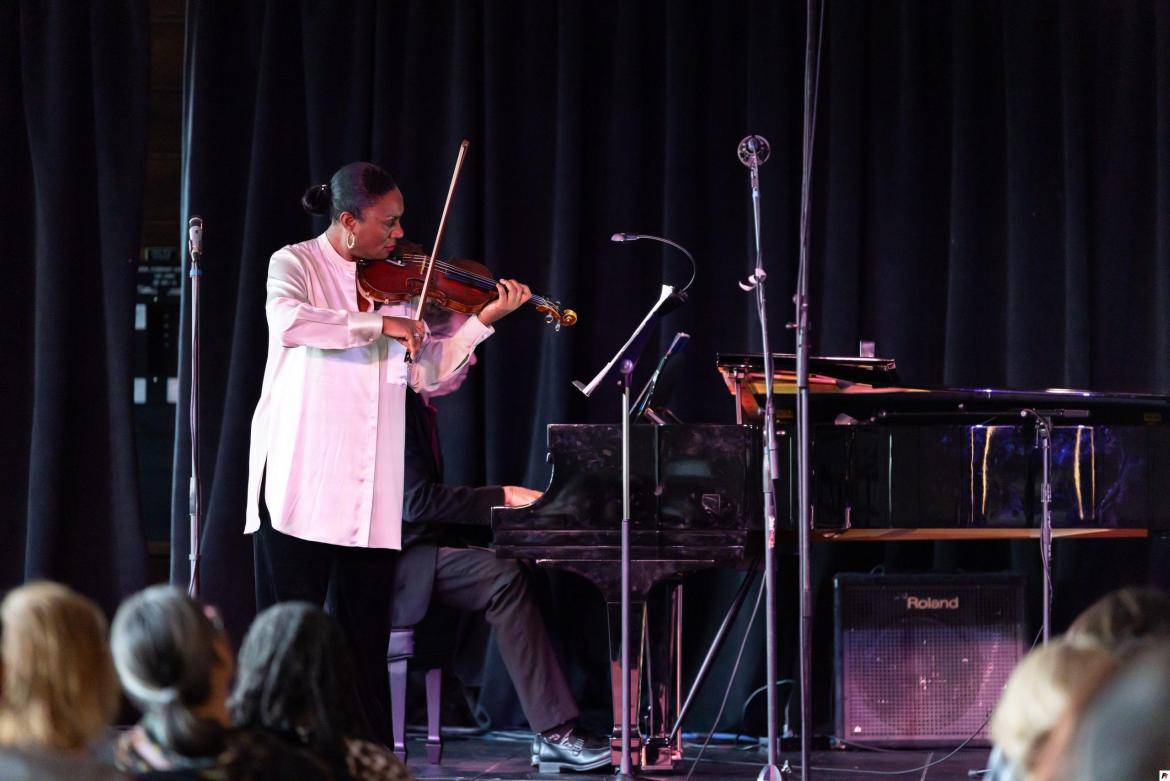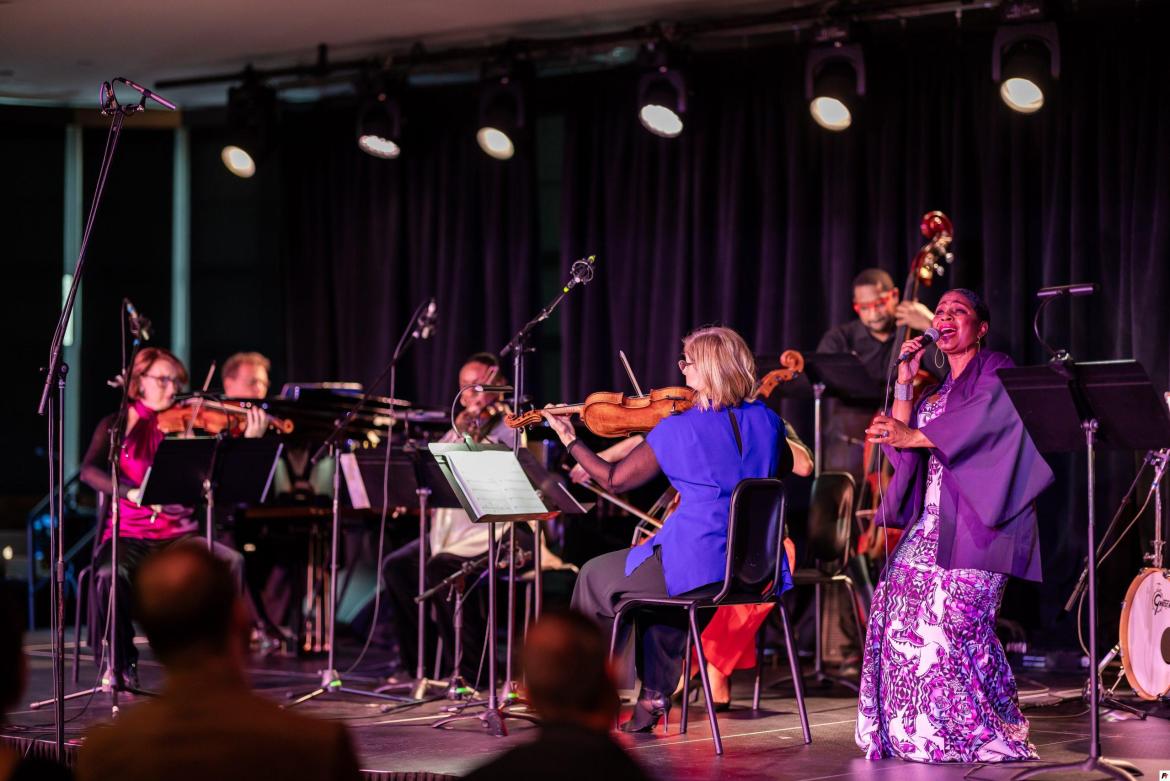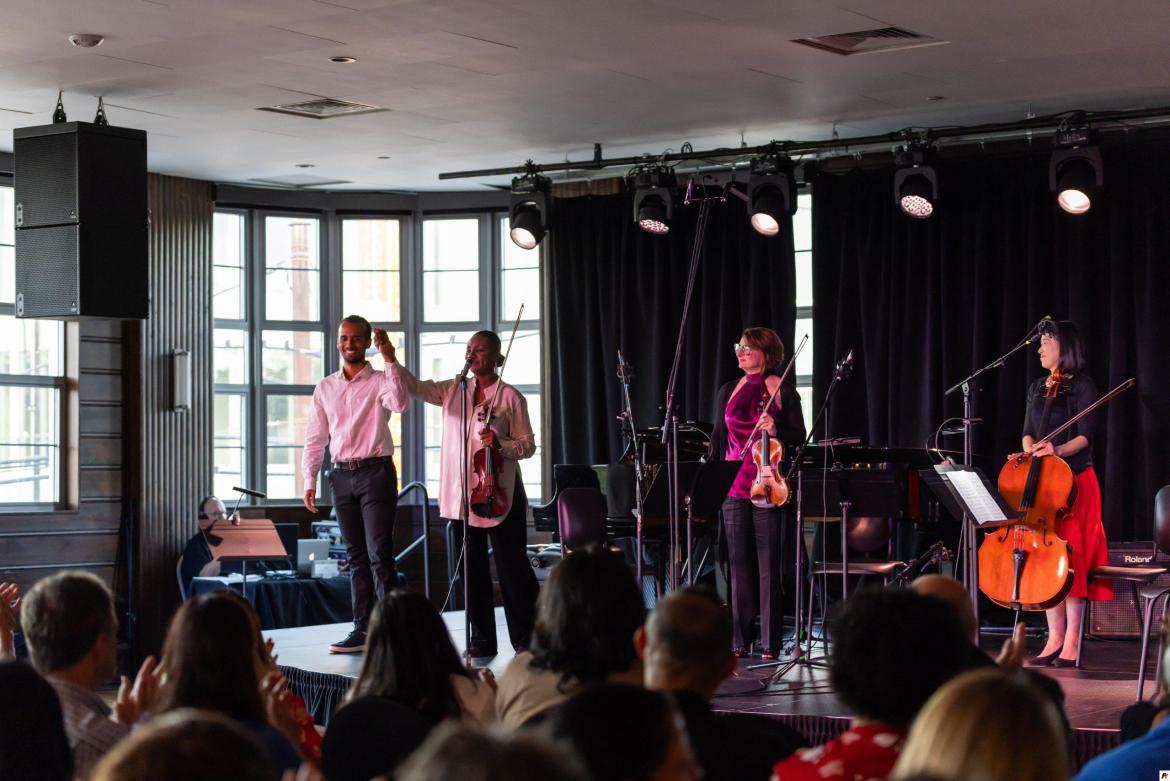
ABOVE: ROCO Unchambered performs at the historic Eldorado Ballroom (Photo by Natalie Gaynor)
Source: ROCO Chamber Orchestra Brings Musical Fusion to Eldorado Ballroom – Forward Times
On Saturday, Nov. 4, the legendary Eldorado Ballroom hosted ROCO for an evening of musical meldings. The ROCO Chamber Orchestra flexes up to 40 musicians from all over the U.S. and Canada. Founded in 2005 by Juilliard graduate and oboist Alecia Lawyer, ROCO has become a “disruptor” in the world of classical music. Violinist Rachel Jordan, who belongs to the organization, brought her family (and friends) to the ballroom for a daring blend of classical and jazz music.
Jordan, a New Orleans native, has been a part of ROCO “since almost the very beginning,” she says. Ms. Jordan played in the Carter Quartet at Loyola University in NOLA and was also a member of the Louisiana Philharmonic Orchestra for 12 years. She is the daughter of jazz saxophonist Edward “Kidd” Jordan, who was chairman of the jazz studies program at Southern University. He played with artists ranging from Ornette Coleman, Ellis Marsalis, and Cannonball Adderley to Ray Charles, Lena Horne, and Aretha Franklin.
Jordan paid tribute to her father (who died in April) through an eclectic set that brought together both jazz and classical music. The concert included new interpretations of classics and some new, original compositions.

Rachel Jordan and Barry Sames (Photo by Natalie Gaynor)
The concert’s first set consisted of songs written entirely by Black composers. First was “Sonata for Two Violins in B Flat,” by composer Chevalier de Saint-Georges. He was a biracial free man from the Caribbean who became the first composer of African descent to earn acclaim in European music. Jordan performed the piece as a duet with violinist Amy Thiaville.
Next came “Syzygy,” by Courtney Bryan (whom Jordan says was one of her father’s students). The violin concerto was composed in three movements by Bryan, who is also from New Orleans. The title refers to a phenomenon where three planetary bodies are in alignment.
“Deserted Garden,” somberly structured as a duet with pianist Barry Sames, left the audience spellbound. Composer Florence Price (1887-1953) was the first Black woman to have her music played by a major American orchestra when the Chicago Symphony played Symphony in E Minor in 1933. Then, more ROCO members came onstage for an orchestral piece called “Aspiration.” It was written by Jai Chatters, “who just happens to be my cousin,” Jordan told the audience. “A little nepotism goes a long way.” Chatters’ piece moved nimbly between soft, legato passages and shorter, more staccato sections.
The second half of the show leaned towards the jazz side and used a larger ensemble. In addition to the strings (Jordan and Thiaville on violin, Suzanne LeFevre on viola, and Shino Hayashi on cello), the group expanded to bring back Sames on piano, Arthur Moyler on bass, and Samuel Knight on the drums. With Jordan’s sister Stephanie Jordan on vocals, the sound – and the mood – changed dramatically.
As the lights turned blue, the music shifted, too. With a simmering rhythm section and Stephanie Jordan on vocal, “Music Came” honored the Jordans’ uncle Alvin Batiste, a renowned jazz clarinetist who founded the Jazz Institute at Southern University. “Music came,” Jordan sang, “way down deep in the depths of sorrow…Slavery didn’t make no difference. Music came.”
“Far from the shore of my native land/Never had family to hold my hand/Wherever, Wherever I might be, the universe provides for me.”

Vocalist Stephanie Jordan accompanied by pianist Barry Sames, ROCO string quartet and Arthur Moyler on bass (Photo by Natalie Gaynor)
Stephanie Jordan then anchored gorgeous versions of Joni Mitchell’s “A Case of You” and “Both Sides Now.” She conveyed the song’s lyrical mix of disillusionment and reflection, sublimely supported by the strings. And she surprised the audience with a lovely version of the Beatles’ classic “Here Comes the Sun.”
Before her final selections, Rachel Jordan reflected on her friends Amy Thiaville and Suzanne LeFevre. “We were all in New Orleans Philharmonic Orchestra together,” she remembered. “We would always find something to do, like party and drink. I mean, we were like the perfect quartet: two violins, viola and cello. But somehow that never entered our mind, that we should actually play a quartet. All weekend was just…having a good time.”
Jordan fondly remembered another friend of hers who was a terrible dancer but loved to dance. “She was an awful dancer. I tried to help her. She just couldn’t do it. But she loved tango. Hence, the tribute piece “Tango for Kae.” Then Jordan paid tribute to her father Kidd Jordan with the punchy, propulsive “River Niger.” Inspired by her father and uncle’s trips to Africa, the piece sizzled with some wonderfully kinetic drumming by Knight and fast, fluid strings.
On the more reflective side, the group also played Rachel Jordan’s composition “A Quiet Place.” Jordan said she wrote the piece thinking of “people who find that they need to have space in their lives. You can find it in yourself.”
The encore featured multiple songs, including the blues song “My Life is a Tree.” And another surprise – a string arrangement of “Second Line,” a tradition in New Orleans brass parades. (The arrangement was based on a piece written by her father.) But perhaps most poignant was Stephanie Jordan’s lead vocal on “Throw it Away,” by jazz singer Abbey Lincoln. “Throw it away; Throw it away/Give your love, live your life/Each and every day,” the song says, adding: “You can never lose a thing if it belongs to you.”

Composer Jai Chatters, Rachel Jordan, Amy Thiaville and Shino Hayashi (Photo by Natalie Gaynor)

Leave A Reply